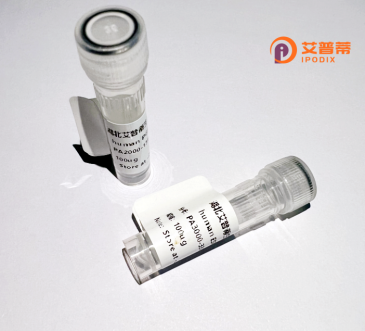
| 纯度 | >90%SDS-PAGE. |
| 种属 | Human |
| 靶点 | ROD1 |
| Uniprot No | O95758 |
| 内毒素 | < 0.01EU/μg |
| 表达宿主 | E.coli |
| 表达区间 | 1-552 aa |
| 活性数据 | MDGVVTDLIT VGLKRGSDEL LSSGIINGPF TMNSSTPSTA NGNDSKKFKR DRPPCSPSRV LHLRKIPCDV TEAEIISLGL PFGKVTNLLM LKGKSQAFLE MASEEAAVTM VNYYTPITPH LRSQPVYIQY SNHRELKTDN LPNQARAQAA LQAVSAVQSG SLALSGGPSN EGTVLPGQSP VLRIIIENLF YPVTLEVLHQ IFSKFGTVLK IITFTKNNQF QALLQYADPV NAHYAKMALD GQNIYNACCT LRIDFSKLTS LNVKYNNDKS RDFTRLDLPT GDGQPSLEPP MAAAFGAPGI ISSPYAGAAG FAPAIGFPQA TGLSVPAVPG ALGPLTITSS AVTGRMAIPG ASGIPGNSVL LVTNLNPDLI TPHGLFILFG VYGDVHRVKI MFNKKENALV QMADANQAQL AMNHLSGQRL YGKVLRATLS KHQAVQLPRE GQEDQGLTKD FSNSPLHRFK KPGSKNFQNI FPPSATLHLS NIPPSVTVDD LKNLFIEAGC SVKAFKFFQK DRKMALIQLG SVEEAIQALI ELHNHDLGEN HHLRVSFSKS TI |
| 分子量 | 59.6 kDa |
| 蛋白标签 | His tag N-Terminus |
| 缓冲液 | PBS, pH7.4, containing 0.01% SKL, 1mM DTT, 5% Trehalose and Proclin300. |
| 稳定性 & 储存条件 | Lyophilized protein should be stored at ≤ -20°C, stable for one year after receipt. Reconstituted protein solution can be stored at 2-8°C for 2-7 days. Aliquots of reconstituted samples are stable at ≤ -20°C for 3 months. |
| 复溶 | Always centrifuge tubes before opening.Do not mix by vortex or pipetting. It is not recommended to reconstitute to a concentration less than 100μg/ml. Dissolve the lyophilized protein in distilled water. Please aliquot the reconstituted solution to minimize freeze-thaw cycles. |
以下是关于重组人ROD1蛋白的3篇参考文献的简要概括(基于公开研究成果,具体文献可能存在差异):
1. **文献名称**:*ROD1 promotes tumor apoptosis through binding to RNA stability factor YBX1 to regulate p21*
**作者**:Li Z, et al.
**摘要**:研究发现ROD1通过结合RNA稳定性因子YBX1.调控p21 mRNA稳定性,从而影响肿瘤细胞凋亡和化疗敏感性。
2. **文献名称**:*The RNA-binding protein ROD1 regulates apoptosis via splicing switch of FASL*
**作者**:Huang H, et al.
**摘要**:揭示ROD1通过调控FASL(Fas配体)的选择性剪接,改变促凋亡与抗凋亡异构体的比例,参与细胞死亡信号通路。
3. **文献名称**:*ROD1 inhibits innate antiviral response by antagonizing TRIM25-mediated RIG-I ubiquitination*
**作者**:Wang Y, et al.
**摘要**:ROD1通过与TRIM25相互作用,抑制RIG-I的泛素化及下游抗病毒信号通路,揭示其在病毒免疫逃逸中的作用机制。
如果需要具体文献来源,建议通过PubMed或Google Scholar搜索上述标题或作者名获取全文。
**ROD1 Protein Overview**
The ROD1 (Regulator of Differentiation 1) protein, encoded by the *ROD1* gene in humans, plays a multifaceted role in cellular processes, including RNA metabolism, cell cycle regulation, and apoptosis. Structurally, it contains conserved RNA-binding motifs and a sterile alpha motif (SAM) domain, enabling interactions with RNA and other proteins. ROD1 is implicated in mRNA splicing, stability, and transport, often acting as a scaffold to coordinate ribonucleoprotein complexes.
Functionally, ROD1 exhibits context-dependent roles. It promotes cell survival under stress by stabilizing anti-apoptotic mRNAs but can also induce apoptosis under specific conditions. Its expression is linked to differentiation and development, with high levels observed in hematopoietic tissues and the nervous system.
In disease contexts, ROD1 is associated with cancer, where it may act as an oncogene or tumor suppressor depending on cellular environment. Overexpression is reported in certain lymphomas and leukemias, correlating with poor prognosis. Conversely, reduced ROD1 levels are linked to neurodegenerative disorders like Alzheimer’s disease, possibly due to dysregulated RNA processing.
Research on ROD1 highlights its potential as a therapeutic target. However, its dual roles in survival and apoptosis necessitate context-specific approaches. Ongoing studies aim to unravel its regulatory networks and explore its utility in treating cancers or neurological diseases.
×